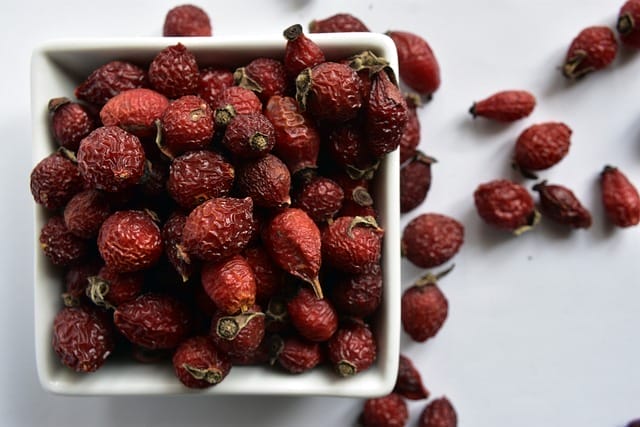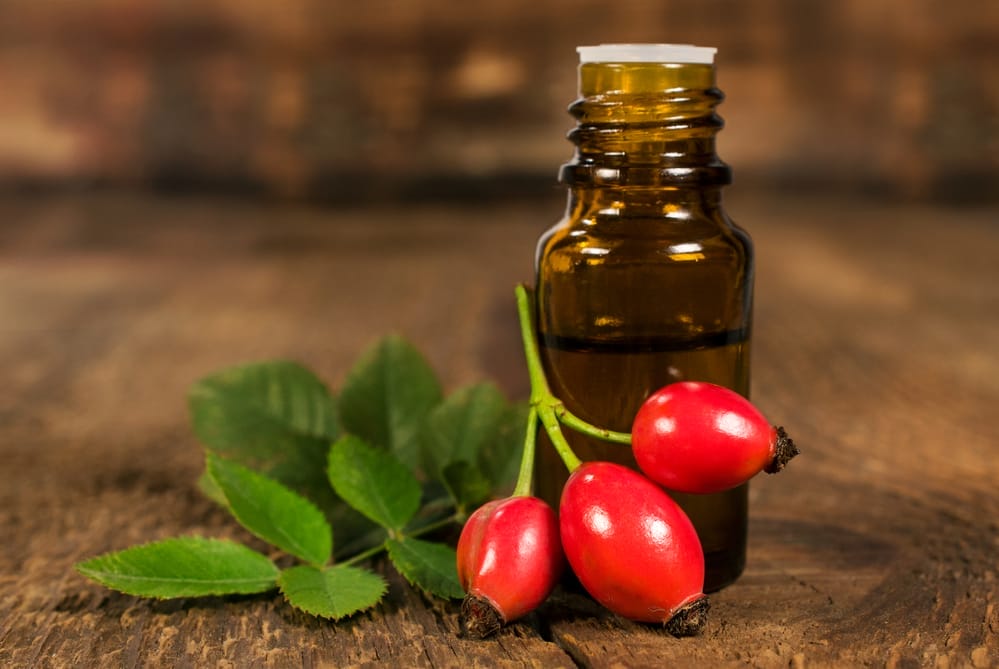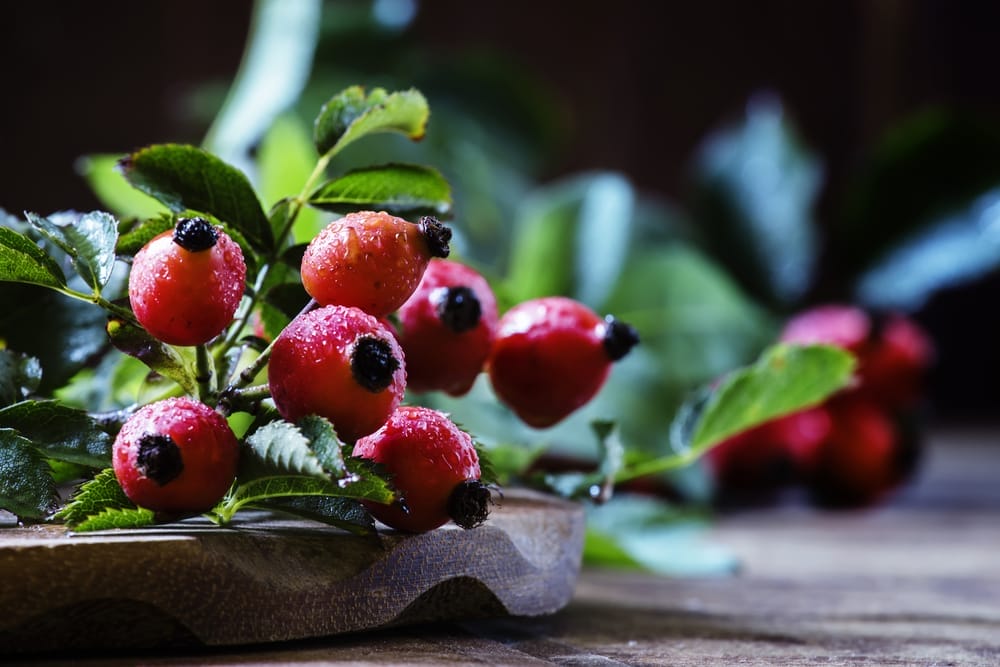Rosehip fruit has been one of the leading raw materials used in herbal medicine for centuries. It hides huge amounts of vitamin C, the power of valuable flavonoids and many other active components, which make it an invaluable support for the entire body. It stimulates the immune system to work, prevents infections and colds, activates the body’s detoxification processes. These are just a few of the numerous health properties of rosehip. In addition to its wide use in phytotherapy, the trump card of rosehip is its brilliant effect on the skin.
Table of contents
- 1 Wild rose – the power of health in small red fruits
- 2 Wild rosehip fruit – composition
- 3 Rosehip fruit for immunity
- 4 Rosehip fruit – medicinal properties.
- 5 How and when to use rosehip fruit?
- 6 When to harvest rosehip fruits?
- 7 How to make rosehip tea?
- 8 Rosehip fruit – culinary uses.
- 9 Wild rose in cosmetics
Wild rose – the power of health in small red fruits

Wild rose is a shrub of the rose family that blooms from May and bears fruit from August. It is a monoecious plant, readily pollinated by insects, including bees and bumblebees. It is extremely hardy, tolerant of low temperatures and undemanding. Its Latin name is Rosa canina L.
Medicinal raw materials are the flowers and fruits of rosehip. Sometimes leaves are also used (e.g. for detoxifying and strengthening infusions). However, the most valued and equipped with the widest range of health properties are the fruits of the plant. They are one of the best plant allies of high immunity of the body.
Wild rose is a fairly tall shrub, reaching about 2.5 meters in height. It has arching downward curved branches, which are covered with thick, hook-like thorns. It is also equipped with egg-shaped, elliptical, toothed leaves and light pink or whitish flowers with 5 petals. The fruiting bodies are slightly elongated or spherical (they are about 2.5 cm), red or red-orange, provided with a fleshy cover, under which are numerous small seed-like fruits.
Wild rose is one of the more commonly seen shrubs in the wild in our country. It is also widespread in many other places, including throughout Europe, Africa, Asia and Australia. As a medicinal plant, it has a very long tradition. It was already used in Hippocratic medicine in the 4th century BC. It gained great fame during World War II. It was a remedy for vitamin C deficiencies and protected against scurvy.
Wild rose prefers temperate and warm climates. Its natural habitats are forest edges, baulks, widespread forests, clearings, thickets, slopes, roadsides, areas near rivers, mountainous areas.
Wild rosehip fruit – composition
Thanks to the abundance of bioactive components, rosehip fruit is a recipe for health, good nutrition of the body, the power of vigor and impeccable well-being. Rosehip fruits contain a lot of vitamin A important for maintaining healthy eyesight, beneficial for skin regeneration and supporting wound healing processes.
Vitamin E, present in rosehip fruits, as a powerful antioxidant, plays an important role in protecting cells from the harmful effects of free radicals. Moreover, wild rose is a rich source of flavonoids, which are a powerful antioxidant and anti-inflammatory army and help in the fight against aging and chronic diseases.
An important advantage of rose fruits, in terms of composition, is also very high in vitamin C. It has about twenty times more of it than citrus and about ten times more than black currant.
On average, rosehip fruit contains 600-1000 mg of vitamin C per 100 g. Interestingly, there is a variety that contains as much as 3500 mg of vitamin C in 100 g of fruit juice. Undeniably, wild rose is one of the richest plants in this vitamin, so if you are looking for products that, when consumed even in small quantities, provide a sizeable vitamin C boost, Rosa canina is ideal for this.
Valuable for health components present in rosehips are:
- flavonoids (isoquercetin, quercetin, rutin, astragalin),
- carotenoids (beta-carotene, zeaxanthin, lycopene, lutein),
- anthocyanins,
- vitamins B1, B2, B3, B6,
- folic acid,
- pectin,
- galactolipids,
- organic acids (citric and malic),
- tannins,
- vitamin A,
- vitamin E,
- vitamin K,
- carotenoids,
- minerals: iron, potassium, magnesium, silicon, calcium.
In addition, the seeds of the rosehip, from which rose oil is produced, contain omega 3 and omega 6 acids, valuable for health.
Rosehip fruit for immunity

Rosehip fruit contains vitamin C, which is excellently absorbed by the body in very high doses, and as is known, this vitamin, when used regularly over a long period of time, supports the process of building natural immunity and accelerates the body’s immune response when pathogens invade. This results in a lower susceptibility to colds and infections of various types and less frequent falling ill.as well as shorter time and lesser intensity of symptoms, if a cold or infection does occur.
In addition to vitamin C, rosehip fruit also contains a number of other components that support the immune system: flavonoids, carotenoids, B vitamins, anthocyanins.
Rosehip fruit supports the immune system in several ways:
- seals blood vessels, protecting them from pathogens,
- blocks the proliferation of free oxygen radicals responsible for oxidative stress on cells and causing damage to them,
- has a strengthening and revitalizing effect on the body and inhibits the aging process,
- inhibits the growth of viruses and bacteria,
- provides a source of dietary fiber which is a food for good bacteria that form intestinal microflora having a great impact on immunity,
- helps regulate inflammatory reactions and reduce the level of pro-inflammatory cytokines, thereby reducing inflammation,
- helps protect the mucous membranes, which provide a defensive coat against viruses and microorganisms,
- supports the process of antibody formation,
- stimulates the activity of immune cells.
Rosehip fruit – medicinal properties.
In addition to strengthening the body’s defense mechanisms, rosehip fruit also exhibits a rich spectrum of other health-promoting properties, including:
- supports the functioning of the digestive system, regulates digestion, combats abdominal pain and diarrhea,
- helps restore mucous membranes, including the gastric mucosa,
- has a beneficial effect on liver function and protects its cells from damage,
- has a diuretic effect, improves the cleansing of the urinary tract, prevents the proliferation of microorganisms in the urinary tract,
- due to its strong anti-inflammatory properties in joint structures, it is extremely helpful in arthritis and osteoarthritis,
- prevents osteoporosis, accelerates the restoration of joint cartilage,
- is abundant in antioxidants, making it a valuable support for people exposed to frequent contact with harmful agents, such as smog, cigarette smoke, chemicals,
- inactivates reactive oxygen species and counteracts cell mutations, thus showing anticancer effects,
- exhibits choleretic and diastolic properties, supports the bile ducts,
- positively influences the work of the kidneys and facilitates their filtering,
- Rose oil used in aromatherapy has a calming, anti-stress, antidepressant and relaxing effect,
- helps detoxify the body from harmful substances,
- has an astringent effect, accelerates tissue regeneration,
- supports the circulatory system, seals and makes blood vessels more flexible, has a beneficial effect on blood clotting processes, helps normalize blood pressure,
- rosehip oil relieves headaches.
How and when to use rosehip fruit?

Rosehip fruit is a versatile way to improve health. It helps with problems with the liver, kidneys, bile ducts, digestive system, heart and high blood pressure.
It works well in cases of accumulation of toxins in the body, use of stimulants, weakened immunity, lack of vitality and high susceptibility to disease. It is also a good choice for poor diet and nutritional deficiencies. It is also worth reaching for during the autumn and winter season to strengthen the body and reduce susceptibility to colds.
Rosehip is commercially available in very many forms. Among others, we can choose from: rosehip juice, dried rosehip fruit, syrups and drops containing rosehip extracts, as well as a whole series of dietary supplements in capsules and tablets. One such preparation with rosehip fruit is NuviaLab Immune. It is a multi-ingredient preparation for improving immunity, which, in addition to rosehip, also contains many other valued ingredients to support the immune system.
When to harvest rosehip fruits?
Rosehip fruits are usually harvested in autumn, when they are firmly ripe. The optimal time is from August to October. During this period, the fruits get their full flavor, color and nutritional value.
Ripe rosehip fruits are intensely red, have a uniform hue, shiny, fresh-looking skin and remain moderately hard. When the fruits are already very soft, wrinkled and brownish, it means they are overripe.
How to make rosehip tea?
Pour 1 heaping teaspoon of dried rosehips over an incomplete cup of very hot, but not boiling, water. We brew under a cover for 10 minutes. Strain. Drink infusions of rosehip 2-3 times a day.
Rosehip fruit – culinary uses.
From fresh rosehip fruits we can make health-promoting juices, syrups, wines and medicinal tinctures. Rose fruits are also great for home production of jams, preserves and baked goods. Rosehip jam or rosehip marmalade is often used to stuff doughnuts.
Wild rose in cosmetics
Wild rose is often used to improve the condition of the skin, with it proving itself both as a revitalizing, nourishing, regenerating and beautifying ingredient. Raw materials used in cosmetics include flowers, fruits and seeds. From the seeds of the rose, an extremely valuable oil for the skin is pressed.
Wild rose, thanks to its high vitamin C content, stimulates the synthesis of collagen responsible for firmness and elasticity of the skin. Vitamin C together with carotenoids brighten the complexion, lighten discoloration and take care of a radiant, uniform skin tone.
Vitamin E present in rosehip slows down the skin’s aging process. Vitamin A strengthens the skin’s protective functions. Flavonoids have a beneficial effect on blood vessels and neutralize free radicals harmful to the skin, while organic acids help exfoliate dead skin, stimulate renewal processes and ensure a vital complexion.
Rosehip fruit is appreciated in home treatments primarily as a base for masks. For such a mask we can use fresh rose fruits, which should be blended, and after obtaining a homogeneous mush, combine with natural yogurt or oil and apply to the face. It can also be dried fruits – pour 1 tablespoon of dried fruits in hot water, drain, add some olive oil and apply to the face.
As an ingredient of homemade masks, rosehip oil will also work perfectly. Combine 1 teaspoon of oil with green clay, mix thoroughly, then apply the resulting slurry to the face.
Rosehip seed oil can also be used for a homemade scrub. Just combine a small amount with brown sugar or coffee grounds. We can also make a scrub from powdered rosehip seeds, which should be mixed with yogurt or buttermilk.
You can also make a homemade facial tonic from the petals of rosehip flowers and dried rosehip fruits.
Sources:
- https://pubmed.ncbi.nlm.nih.gov/35897912/
- https://pubmed.ncbi.nlm.nih.gov/36838668/
- https://www.healthline.com/health/rosehip-oil-benefits
- https://www.healthline.com/nutrition/rose-hips
- https://www.healthline.com/nutrition/rosehip-tea

